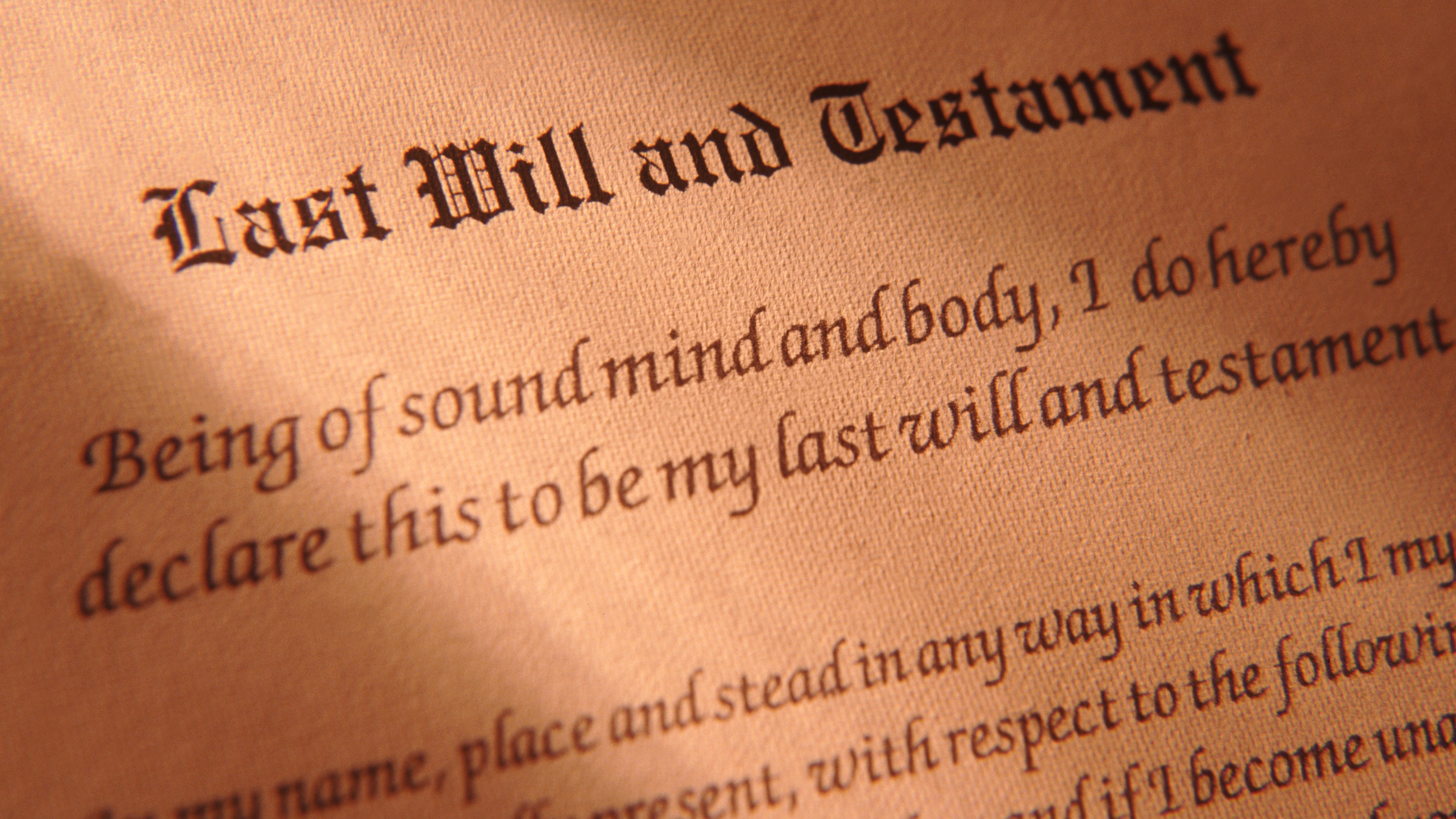What Happens if You Die Without a Will?
An elder law attorney explains the importance of a last will and testament, beneficiary designations and other critical estate planning issues.


Profit and prosper with the best of Kiplinger's advice on investing, taxes, retirement, personal finance and much more. Delivered daily. Enter your email in the box and click Sign Me Up.
You are now subscribed
Your newsletter sign-up was successful
Want to add more newsletters?

Delivered daily
Kiplinger Today
Profit and prosper with the best of Kiplinger's advice on investing, taxes, retirement, personal finance and much more delivered daily. Smart money moves start here.

Sent five days a week
Kiplinger A Step Ahead
Get practical help to make better financial decisions in your everyday life, from spending to savings on top deals.

Delivered daily
Kiplinger Closing Bell
Get today's biggest financial and investing headlines delivered to your inbox every day the U.S. stock market is open.

Sent twice a week
Kiplinger Adviser Intel
Financial pros across the country share best practices and fresh tactics to preserve and grow your wealth.

Delivered weekly
Kiplinger Tax Tips
Trim your federal and state tax bills with practical tax-planning and tax-cutting strategies.

Sent twice a week
Kiplinger Retirement Tips
Your twice-a-week guide to planning and enjoying a financially secure and richly rewarding retirement

Sent bimonthly.
Kiplinger Adviser Angle
Insights for advisers, wealth managers and other financial professionals.

Sent twice a week
Kiplinger Investing Weekly
Your twice-a-week roundup of promising stocks, funds, companies and industries you should consider, ones you should avoid, and why.

Sent weekly for six weeks
Kiplinger Invest for Retirement
Your step-by-step six-part series on how to invest for retirement, from devising a successful strategy to exactly which investments to choose.
As an elder law attorney, I am continuingly asked, “What happens if I die without a will?” The most accurate answer is, “I don’t have a clue,” and sadly, you probably don’t either.
When you pass away, you want your estate passed down to the beneficiaries you choose. But it’s not that simple. There are certain rules and procedures that are already being applied to your assets whether you realize it or not.
The first rule is that a last will and testament controls assets that are solely in your name. This can be especially important when it comes to blended families. For example, if a parent has a will leaving everything to his children from a previous marriage but has named his current wife as a joint owner or beneficiary over the house and financial accounts, then the will essentially becomes obsolete. This is because joint ownership and beneficiary designations supersede the will.
From just $107.88 $24.99 for Kiplinger Personal Finance
Become a smarter, better informed investor. Subscribe from just $107.88 $24.99, plus get up to 4 Special Issues

Sign up for Kiplinger’s Free Newsletters
Profit and prosper with the best of expert advice on investing, taxes, retirement, personal finance and more - straight to your e-mail.
Profit and prosper with the best of expert advice - straight to your e-mail.
Here is an example: A married couple have recently divorced, but they share a child. If the father signs a new will leaving everything to the child but names a sibling as a beneficiary of his life insurance policy, once he dies, that money will go to the sibling, not the child.
A law to keep in mind
Another rule that’s crucial to keep in mind is the law of intestate succession. That means if someone dies without proper planning, their estate will automatically go to their next of kin. The law is state-specific, but generally follows the family tree. Your spouse will get most of it, and the rest will be passed down to your children.
This could be detrimental depending on the individual’s situation. Let’s say you and your spouse both die without a will in place. According to the law, your estate would automatically go to your children as long as they’re over the age of 18. For some families, that may not be the best option. Having a will in place allows you to place restrictions on how your children receive their inheritance. Maybe you don’t want them to have access to their inheritance until they’re older, or maybe you want them to use it for something specific, like education. You must clearly state that in your will. Otherwise, they’ll be entitled to use their inheritance however they want.
If you understand the rules, you can ensure that you create a plan that passes your estate down to the beneficiaries that you want and not unintended beneficiaries. So long as you have a will, you have the power to control how and when your beneficiaries receive their inheritance and who will be in charge of administering your estate. Without a will in place, those decisions will be determined by the law.
Why a complete estate plan is so important
As important as it is, having a last will and testament is only a part of the estate planning process. If you rely on just a will, your estate will have to go through probate, which can take months or even years, depending on the size and complexity of your situation. In addition, a will has nothing to do with appointing someone to make your medical and financial decisions if you become unable to do so. This is why it is so important to have a complete estate plan in place.
A good estate plan has the documents needed for any situation that might arise. This includes designating a medical power of attorney, a financial power of attorney, a revocable trust agreement that allows you to pass your estate down to your beneficiaries without the need of probate court and, finally, a last will and testament.
With a complete estate plan, you have the power to protect your estate while you’re alive, ensuring that your wishes will be followed once you’re gone.
Related Content
- 14 Rapid-Fire Estate Planning Tips
- 10 Things You Should Know About Estate Planning
- Common Estate Planning Mistakes
- Estate Plan Check-Ups: Don’t Just Set It and Forget It
- 2024 Uncertainty Highlights Need for Estate Plan Flexibility
Profit and prosper with the best of Kiplinger's advice on investing, taxes, retirement, personal finance and much more. Delivered daily. Enter your email in the box and click Sign Me Up.

Patrick M. Simasko is an elder law attorney and financial adviser at Simasko Law and Simasko Financial, specializing in elder law and wealth preservation. He’s also an Elder Law Professor at Michigan State University School of Law. His self-effacing character, style and ability have garnered him prominence and recognition throughout the metro Detroit area as well as the entire state.
-
 Look Out for These Gold Bar Scams as Prices Surge
Look Out for These Gold Bar Scams as Prices SurgeFraudsters impersonating government agents are convincing victims to convert savings into gold — and handing it over in courier scams costing Americans millions.
-
 How to Turn Your 401(k) Into A Real Estate Empire
How to Turn Your 401(k) Into A Real Estate EmpireTapping your 401(k) to purchase investment properties is risky, but it could deliver valuable rental income in your golden years.
-
 My First $1 Million: Retired Nuclear Plant Supervisor, 68
My First $1 Million: Retired Nuclear Plant Supervisor, 68Ever wonder how someone who's made a million dollars or more did it? Kiplinger's My First $1 Million series uncovers the answers.
-
 Don't Bury Your Kids in Taxes: How to Position Your Investments to Help Create More Wealth for Them
Don't Bury Your Kids in Taxes: How to Position Your Investments to Help Create More Wealth for ThemTo minimize your heirs' tax burden, focus on aligning your investment account types and assets with your estate plan, and pay attention to the impact of RMDs.
-
 Are You 'Too Old' to Benefit From an Annuity?
Are You 'Too Old' to Benefit From an Annuity?Probably not, even if you're in your 70s or 80s, but it depends on your circumstances and the kind of annuity you're considering.
-
 In Your 50s and Seeing Retirement in the Distance? What You Do Now Can Make a Significant Impact
In Your 50s and Seeing Retirement in the Distance? What You Do Now Can Make a Significant ImpactThis is the perfect time to assess whether your retirement planning is on track and determine what steps you need to take if it's not.
-
 Your Retirement Isn't Set in Stone, But It Can Be a Work of Art
Your Retirement Isn't Set in Stone, But It Can Be a Work of ArtSetting and forgetting your retirement plan will make it hard to cope with life's challenges. Instead, consider redrawing and refining your plan as you go.
-
 The Bear Market Protocol: 3 Strategies to Consider in a Down Market
The Bear Market Protocol: 3 Strategies to Consider in a Down MarketThe Bear Market Protocol: 3 Strategies for a Down Market From buying the dip to strategic Roth conversions, there are several ways to use a bear market to your advantage — once you get over the fear factor.
-
 For the 2% Club, the Guardrails Approach and the 4% Rule Do Not Work: Here's What Works Instead
For the 2% Club, the Guardrails Approach and the 4% Rule Do Not Work: Here's What Works InsteadFor retirees with a pension, traditional withdrawal rules could be too restrictive. You need a tailored income plan that is much more flexible and realistic.
-
 Retiring Next Year? Now Is the Time to Start Designing What Your Retirement Will Look Like
Retiring Next Year? Now Is the Time to Start Designing What Your Retirement Will Look LikeThis is when you should be shifting your focus from growing your portfolio to designing an income and tax strategy that aligns your resources with your purpose.
-
 I'm a Financial Planner: This Layered Approach for Your Retirement Money Can Help Lower Your Stress
I'm a Financial Planner: This Layered Approach for Your Retirement Money Can Help Lower Your StressTo be confident about retirement, consider building a safety net by dividing assets into distinct layers and establishing a regular review process. Here's how.